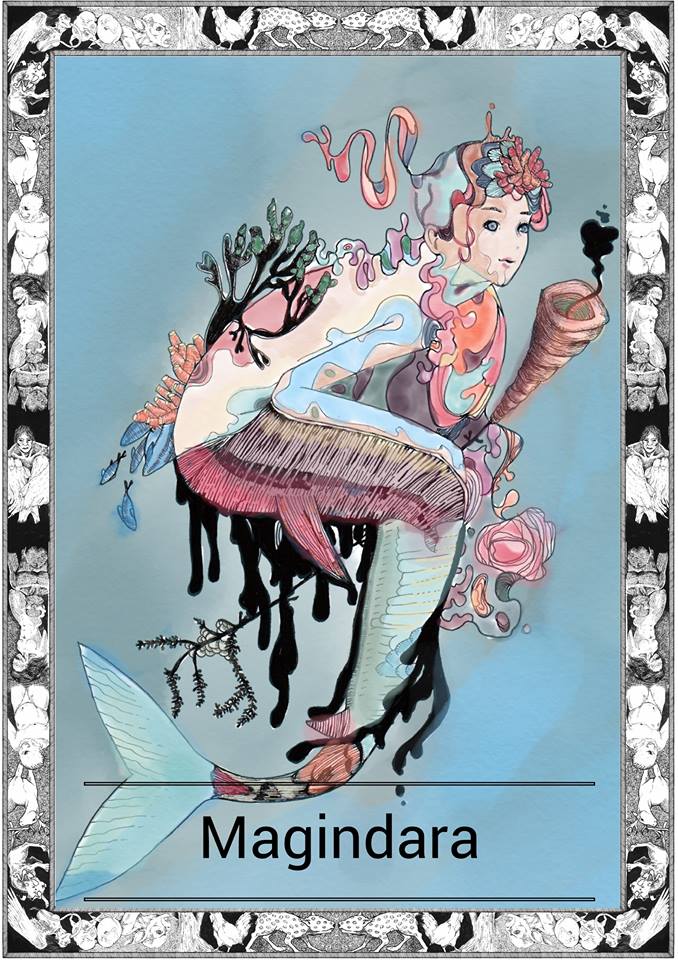Bikolano myths paint the Magindara in extremes; they are either said to be guardian deities of Bikolano fishermen, or “aswang ng dagat” who will eat adult humans but do not harm children (a sharp difference from Tagalog sirena myths that show children as their preferred sacrifices). They are briefly mentioned in the Ibalon.
Beautiful but vicious creatures of the sea, they have colorful sharp scales, and enchanting voices that can lure fishermen to their deaths, or draw them to their rescue. Some believe that the Magindara can summon aswang at will.
Here are the Ibalon stanzas containing mention of the Magindara. (translated to Bikolano and English from the Spanish text)
22.
Manga kahalasan na tingog kabagay
Kan sa magindarang kinawiwilihan,
Sa dakulang lungib, Hamtik na kabuldan
Gabos rinolobong na dai nin hanggan.
{The serpents whose voice did enthrall
Like the siren’s tempting call,
In Hantic’s wide cavernous hall
Forever they were buried all.}
27.
Sa daing hingalo na pasunod-sunod
Saiyang pagsusog kadlagan linakop,
Huling sa paghuna magindarang tingog
Si duman na iyong saiyang nadangog.
{How many times without a rest,
He searched her into the woods,
He thought that what had lured him on
Believing the voice of a siren there!}
Magindara Illustration by emirajuju
IG: https://www.instagram.com/emirajuju/
Watercolor by Mykie Concepcion
Tumblr: http://mykieconcepcion.tumblr.com/
A Magindara Tale
“They will save me.”
The waves crash over the fisherman’s head. He tries to tread water but the storm will not let up. Thousands upon millions of raindrops batter the ocean’s shapeless form, but he knows they will pass. They did not lead him here to drown and he will trust in them until the end of his days.
He remembers the tears in his mother’s eyes when he tossed her rosary aside. She was scared for him, but more concerned for his soul. The fisherman was his father’s son and carried on believing in the old ways because the water was in his blood.
His mother begged him to trust his savior, their savior. The one she had raised him to remember in love and light, but he couldn’t listen to her. She could never understand the life they had at sea, the guardians that protected them.
“Aswang ng Dagat” – that’s what they called them. They say that the spirits lured fishermen into the water with their songs to drown and eat them. It still surprised him how long that lie had lasted and how many people still believed in it. The fishermen knew those stories for what they were: a brush used to paint over the centuries of respect and admiration of the spirits.
There was nothing he could do though. The years had changed what people turned to in their times of need. There were no more offerings by the sea, or prayers to the waves. What was left was him. The last son of a dying belief.
The fisherman’s arms are getting weak now. His body is finally surrendering to the endless onslaught of the waves and the rain. He thinks back to his mother and stays firm in his conviction. His lips release one final prayer before his head goes beneath the waves:
The water will lead me home
I will trust in you
O spirits of storm and sea
The darkness will turn into light
The waves will calm
I will be with the sea
Inspired by the Magindara entry in Bikol Beliefs and Folkways: A Showcase of Tradition. Nasayao 2010.
For more stories follow The Spirits of the Philippine Archipelago
ALSO READ: Sirena Stories, the Mythical Mermaid of the Philippines
Speculative fiction writer. Philippine folklore and heritage researcher.
Author of The Spirits of the Philippine Archipelago.
Currently in the middle of fixing up an encyclopedia of Philippine Mythical creatures.



